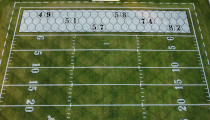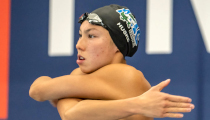Among the earliest female pioneers to break through as a rising high school state association administrator was Bonnie Northcutt of the Texas University Interscholastic League (UIL). Her nearly 40 years of service to Texas high school athletics and activities came just as Title IX legislation was passed in 1972, opening new doors for girls longing to participate in sports. The native of Barksdale, Texas, overcame stigmas commonly looming over females in the era, and certainly didn’t allow skeptics to prevent her from accomplishing her duties with rules, eligibility and running tournaments.
In 1995, former UIL Executive Director Dr. William Farney reassigned Northcutt to a new role of policy director. Looking to scale back to increase time with her family, Farney helped Northcutt craft her new role that lessened her amount of work with tournaments on weekends. She maintained contributions in that role until 2010, when she officially retired from the UIL. Northcutt worked alongside fellow pioneer Susan True when she served as chair of the NFHS Volleyball Rules Committee in the 1980s. In addition to her involvement with other NFHS rules committees, Northcutt also served on the United States Olympic Games Preparation Committee in 1981.
Question: With the 50th anniversary of Title IX approaching in June, what does that law mean to you?
Northcutt: To me, a big part of Title IX is knowing the great feeling received by millions of girls since 1972 upon learning they had the opportunity to participate in athletics that they didn’t previously have. I think that growing up and being able to compete is just as important, if not even more important, for girls than for boys.
Question: You participated in tennis, basketball, volleyball and track. How did participation evolve for you as a young girl in Texas? At what age did you begin competing in state-sanctioned events?
Northcutt: I was unusual because I went to a very small school. There were around 45 people in high school at that time, and the girls had already been competing in basketball for a long time. I had opportunities to compete in all those activities.
The nice thing about that was when I was a freshman, we played a nearby community college. Their coach said, “Number 20, are you a senior?” I said, “No, sir. I’m a freshman.” He said, “When you graduate, you’ve got a scholarship.”
Every year when we played them by that time, he knew me by my name and we became friends, and reminded me that I had that athletic scholarship. So that’s actually how I started college.
I played basketball and tennis both at Southwest Texas Junior College for a year. I then married my high school sweetheart, who was a student at Texas A&M University, and stayed out for a long time because I worked while he was in grad school.
Question: How common was it at that time in Texas for a skilled, athletic female such as yourself to receive an athletic scholarship?
Northcutt: I don’t think it occurred very often, but I really don’t know for sure having never seen statistics on it. My fortune came true because we had the unusual situation with a small junior college playing small high schools.
I grew up without any indoor plumbing or a telephone. My parents were ranchers. It was a wonderful way to grow up. We all worked hard. We had a wonderful loving family. However, we were somewhat isolated. If it hadn’t been for playing ball, I never would have gone to the state capitol, and I never would have gotten to do a lot of things.
Question: Since girls participation in basketball was more commonplace in Texas at the time, what were some of the differences in participation for your other sports in tennis, track and volleyball?
Northcutt: There was probably less participation in track and field. Tennis probably stayed about the same because it had been covered for a long time. My mother and her sister competed in doubles in tennis when they were in high school.
At that time, high school basketball for girls in Texas was still a six-player game with the split court. I think that probably had the most profound change with regard to girls sports at the time.
Volleyball at that time was not nearly as big as it is now. I think it probably grew a lot more because of Title IX. And, of course, Title IX brought the big schools into competition because small schools had already been competing for a long time.
Question: What effects did you feel as a high school student- athlete prior to Title IX?
Northcutt: I think participation makes you more confident in the things that you can do. I think it bleeds over into all kinds of things. Whether you are captain of an athletic team as a high school student-athlete, or you’re working in an office or in an organization like the Texas UIL, it’s still a team effort. All of those kinds of things let you grow in the area that you need to grow in order to be successful in life.
Question: You were hired by the University Interscholastic League (UIL) in 1972, the same year Title IX legislation was passed. What challenges did you face as a young female administrator in a predominantly male-oriented profession?
Northcutt: It was very interesting. I was the first female and immediately, my boss, Dr. Ray Williams, and Dr. Bailey Marshall, let me know that I would not be doing just girls athletics. They let me know I would be doing everything. They were wonderful to me because they really wanted me to contribute. Those were the days before cell phones and when they were on the road, they needed somebody in the office that knew the rules.
My first telephone calls came from coaches, superintendents and principals that all needed an eligibility answer. Immediately when the receptionist told them that she would connect them with Bonnie Northcutt, they said, “We want to talk to one of the men.” Our receptionist would let them know that she’d still let them speak with me. They put me on the line and I said, “Well, the men are in West Texas and they’ll be back in about three days. If you’ll tell me what question you have, I think I can show you where to find it in the book.” I was pleasant the whole way through it and it didn’t hurt my feelings. I understood it.
After that, they would sometimes ask for me because I knew they’re going to get a quick answer and a page number.
Question: Being one of the first females to climb the ranks of administration, did you ever have any mentors during your early career? What role did they play?
Northcutt: I think I had a lot of mentors, and those individuals were supportive. They were also proud of me, and they let me know that. I’m not going to start naming mentors because I would leave someone out that I needed to mention, but there were several people that helped me along the way who were all wonderful.
Whenever you have somebody that supports you, you can do whatever you need to do. And the other thing is you can also have fun. I loved my work because it was fun. It can also be quite negative because many days are spent telling people, “I’m sorry, he’s ineligible.” Or, I’d say, “Coach, let me make sure you understand that I just said no, that is a violation.”
Question: Were there any other females at that time that you connected with and who shared similar experiences as you?
Northcutt: Dorothy McIntyre, Karen Kuhn and a whole bunch of women. I think we all shared somewhat of the same experience. The fact that I had a family, and some of my cohorts and mentors did not, made a little bit of a difference. When I was offered some jobs out of state, I said, “I’m sorry. I appreciate that, but I cannot accept it. I have a family in Austin.”
Question: In 1995, the position of policy director was created for you by former UIL Executive Director Dr. William Farney. What led to the creation of that role?
Northcutt: I went to my boss and said, “I have a husband who’s tired of me working all weekends, running tournaments and all those kinds of things. I need to slow it down a bit.” They told me they would change it up and let me do other things – some of which I was already doing – but it took away some of my duties on weekends. I was no longer serving as an assistant tournament director or directing tournaments so it gave me more family time.
By the time I wanted to retire after Dr. Farney named me policy director, I had worked in that area several years. In 2002, I told him, “Dr. Farney, I have elderly parents and in-laws that I need to be helping take care of 300 miles away from me, so I need to retire.” He said, “You can retire if you’ll come back half time with very flexible work regulations. So that’s what I did.”
Question: What did you achieve as a result of your work as policy director?
Northcutt: I think I helped keep the legislature from trying to abolish us several times. When you go to the Capitol, you run into some wonderful people who can also be mentors. They will call you back behind the door and say, “You need to come down here. We’re in session, but I need to meet you in the hall and ask you some questions.” So, they supported us in that way.
Question: When you look back at your list of accomplishments, what stands out to you as the most significant and why?
Northcutt: I never really thought too much about accomplishments. You just meet so many wonderful people, and you work with so many wonderful people within your own office. With those kind of associations, you don’t get accomplishments through the work you do just yourself. You get them because a lot of people have helped them come true.
Working with Susan True at the National Federation was truly a wonderful experience. We were great friends. We shared all kinds of things through the years, especially when I was starting as chair of the NFHS Volleyball Rules Committee. I enjoyed that very much, but I enjoyed most everything that I did. I don’t think of it really as an accomplishment. I was just very lucky to be where I was.







